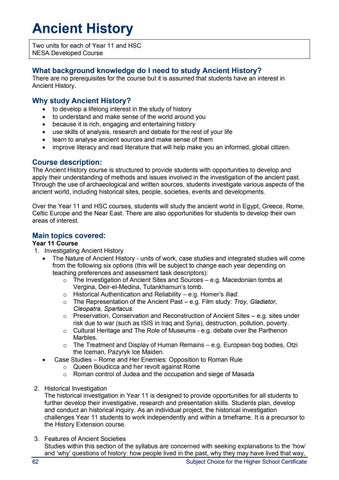Ancient History Two units for each of Year 11 and HSC NESA Developed Course
What background knowledge do I need to study Ancient History? There are no prerequisites for the course but it is assumed that students have an interest in Ancient History.
Why study Ancient History? • • • • • •
to develop a lifelong interest in the study of history to understand and make sense of the world around you because it is rich, engaging and entertaining history use skills of analysis, research and debate for the rest of your life learn to analyse ancient sources and make sense of them improve literacy and read literature that will help make you an informed, global citizen.
Course description: The Ancient History course is structured to provide students with opportunities to develop and apply their understanding of methods and issues involved in the investigation of the ancient past. Through the use of archaeological and written sources, students investigate various aspects of the ancient world, including historical sites, people, societies, events and developments. Over the Year 11 and HSC courses, students will study the ancient world in Egypt, Greece, Rome, Celtic Europe and the Near East. There are also opportunities for students to develop their own areas of interest.
Main topics covered: Year 11 Course 1. Investigating Ancient History • The Nature of Ancient History - units of work, case studies and integrated studies will come from the following six options (this will be subject to change each year depending on teaching preferences and assessment task descriptors): o The Investigation of Ancient Sites and Sources – e.g. Macedonian tombs at Vergina, Deir-el-Medina, Tutankhamun’s tomb. o Historical Authentication and Reliability – e.g. Homer’s Iliad. o The Representation of the Ancient Past – e.g. Film study: Troy, Gladiator, Cleopatra, Spartacus. o Preservation, Conservation and Reconstruction of Ancient Sites – e.g. sites under risk due to war (such as ISIS in Iraq and Syria), destruction, pollution, poverty. o Cultural Heritage and The Role of Museums - e.g. debate over the Parthenon Marbles. o The Treatment and Display of Human Remains – e.g. European bog bodies, Otzi the Iceman, Pazyryk Ice Maiden. • Case Studies – Rome and Her Enemies: Opposition to Roman Rule o Queen Boudicca and her revolt against Rome o Roman control of Judea and the occupation and siege of Masada 2. Historical Investigation The historical investigation in Year 11 is designed to provide opportunities for all students to further develop their investigative, research and presentation skills. Students plan, develop and conduct an historical inquiry. As an individual project, the historical investigation challenges Year 11 students to work independently and within a timeframe. It is a precursor to the History Extension course. 3. Features of Ancient Societies Studies within this section of the syllabus are concerned with seeking explanations to the ‘how’ and ‘why’ questions of history: how people lived in the past, why they may have lived that way, 62
Subject Choice for the Higher School Certificate




